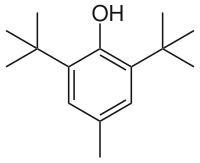
Photo from wikipedia
Natural antioxidants are a very large diversified family of molecules classified by activity (enzymatic or nonenzymatic), chemical-physical properties (e.g., hydrophilic or lipophilic), and chemical structure (e.g., vitamins, polyphenols, etc.). Research… Click to show full abstract
Natural antioxidants are a very large diversified family of molecules classified by activity (enzymatic or nonenzymatic), chemical-physical properties (e.g., hydrophilic or lipophilic), and chemical structure (e.g., vitamins, polyphenols, etc.). Research on natural antioxidants in various fields, such as pharmaceutics, nutraceutics, and cosmetics, is among the biggest challenges for industry and science. From a biomedical point of view, the scavenging activity of reactive oxygen species (ROS) makes them a potential tool for the treatment of neurodegenerative diseases including Alzheimer’s disease, Parkinson’s disease, Huntington’s disease, dementia, and amyotrophic lateral sclerosis (ALS). In addition to the purified phytochemical compounds, a variety of natural extracts characterized by a complex mixture of antioxidants and anti-inflammatory molecules have been successfully exploited to rescue preclinical models of these diseases. Extracts derived from Ginkgo biloba, grape, oregano, curcumin, tea, and ginseng show multitherapeutic effects by synergically acting on different biochemical pathways. Furthermore, the reduced toxicity associated with many of these compounds limits the occurrence of side effects. The support of nanotechnology for improving brain delivery, controlling release, and preventing rapid degradation and excretion of these compounds is of fundamental importance. This review reports on the most promising results obtained on in vitro systems, in vivo models, and in clinical trials, by exploiting natural-derived antioxidant compounds and extracts, in their free form or encapsulated in nanocarriers.
Journal Title: ACS Omega
Year Published: 2022
Link to full text (if available)
Share on Social Media: Sign Up to like & get
recommendations!